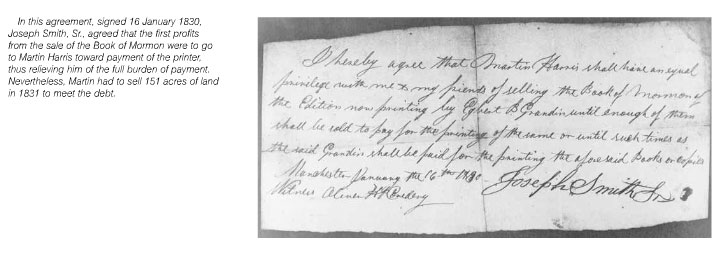In the Summer of 1829 Joseph gave a false revelation regarding the selling of the copyright of the Book of Mormon in Canada. In the wake of its discovery, Joseph admitted that:
Some revelations are of God; some revelations are of men; and some revelations are of the devil. (David Whitmer, An Address to All Believers in Christ, p. 31)
The occasion was described by David thus:
Brother Hyrum was vexed with Brother Martin, and thought they should get the money by some means outside of him, and NOT let him have anything to do with the publication of the Book, or receiving any of the PROFITS thereof if any profits should accrue. He was wrong in thus judging Brother Martin, because he was doing all he could toward selling his land.
Brother Hyrum said it had been suggested to him that some of the brethren might go to Toronto, Canada, and sell the copyright of the Book of Mormon for considerable money: and he persuaded Joseph to inquire of the Lord about it. Joseph concluded to do so. He had not yet given up the stone. Joseph looked into the hat in which he placed the stone, and received a revelation that some of the brethren should go to Toronto, Canada, and that they would sell the copyright of the Book of Mormon. (Ibid)
Joseph manifested an alarming disposition to get revelations to cover every exigency that would arise, and in this he was eagerly urged on by some of his associates, who would frequently come to him with the request that he “ask the Lord” about this thing or the other. The first striking instance of it, and one that gave rise to grave apprehensions in the minds of David Whitmer and others of his kind, occurred in connection with the publishing of the first edition of the Book of Mormon. Martin Harris was a well-to-do farmer, and he was expected to mortgage his property for the purpose of raising the necessary funds for the printing of the book. His seeming reluctance to act in the matter, which Mr. Whitmer attributes to the cautious business-like manner in which he did everything, offended some of the brethren, and Hyrum Smith, the “Patriarch,” proposed that some of them take the manuscript to Canada, and there sell the copyright for sufficient money to enable them to get out the publication. A revelation was procured “to order” and “warranted to fit,” a thing which occurred with remarkable frequency afterwards and which caused it to be a matter of foregone conclusion that whatever the desires of the favored few expressed, or the pressing emergency of the hour demanded, it would be admirably embodied in the “message from heaven.” Thus “the word of the Lord came,” directing that two of the brethren go to Canada as suggested. They went. They also returned, but they brought no money with them, and no promise of any. (The Omaha Herald, October 10, 1886; Des Moines Daily News, October 16, 1886; Chicago Inter-Ocean, October 17, 1886; Philadelphia Press, October 17, 1886; The Salt Lake Daily Tribune (vol. XXXI, no. 3), October 17, 1886.)
B. H. Roberts concurred with David when he acknowledged the truth of the principles involved:
These are the principles recognized in the answer—“some revelations are of God; some revelations are of men; and some revelations are of the devil”—of Joseph Smith to his questioning disciples; and in this instance of the Toronto journey, Joseph was evidently not directed by the inspiration of the Lord. Does that circumstance vitiate his claim as a prophet? No; the fact remains that despite this circumstance there exists a long list of events to be dealt with which will establish the fact of divine inspiration operating upon the mind of this man Joseph Smith. The wisdom frequently displayed, the knowledge revealed, the predicted events and the fulfilment thereof, are explicable upon no other theory than of divine inspiration giving guidance to him. (B. H. Roberts, A Comprehensive History of The Church of Jesus Christ of Latter-day Saints, 6 vols. (Salt Lake City: Deseret News Press, 1930), 1: 162 -166. Original revelation here.)
The principles entailed in the revelation are true, and David’s account was honest. Joseph’s apologists however would like to blame anyone but the revelation itself. The error was the presumption that Martin wasn’t trying to sell his farm, and them wanting to keep the profits for themselves after all Martin had done. THAT was the error.
After Martin found out about it, Joseph had to guarantee Martin, in writing, that he would have first rights to any profits. This letter substantiates David’s claim:
(Church History in the Fullness of Times, Student Manual, Religion 341-43, Church of Jesus Christ of Latter-day Saints, 2003, p. 65)
